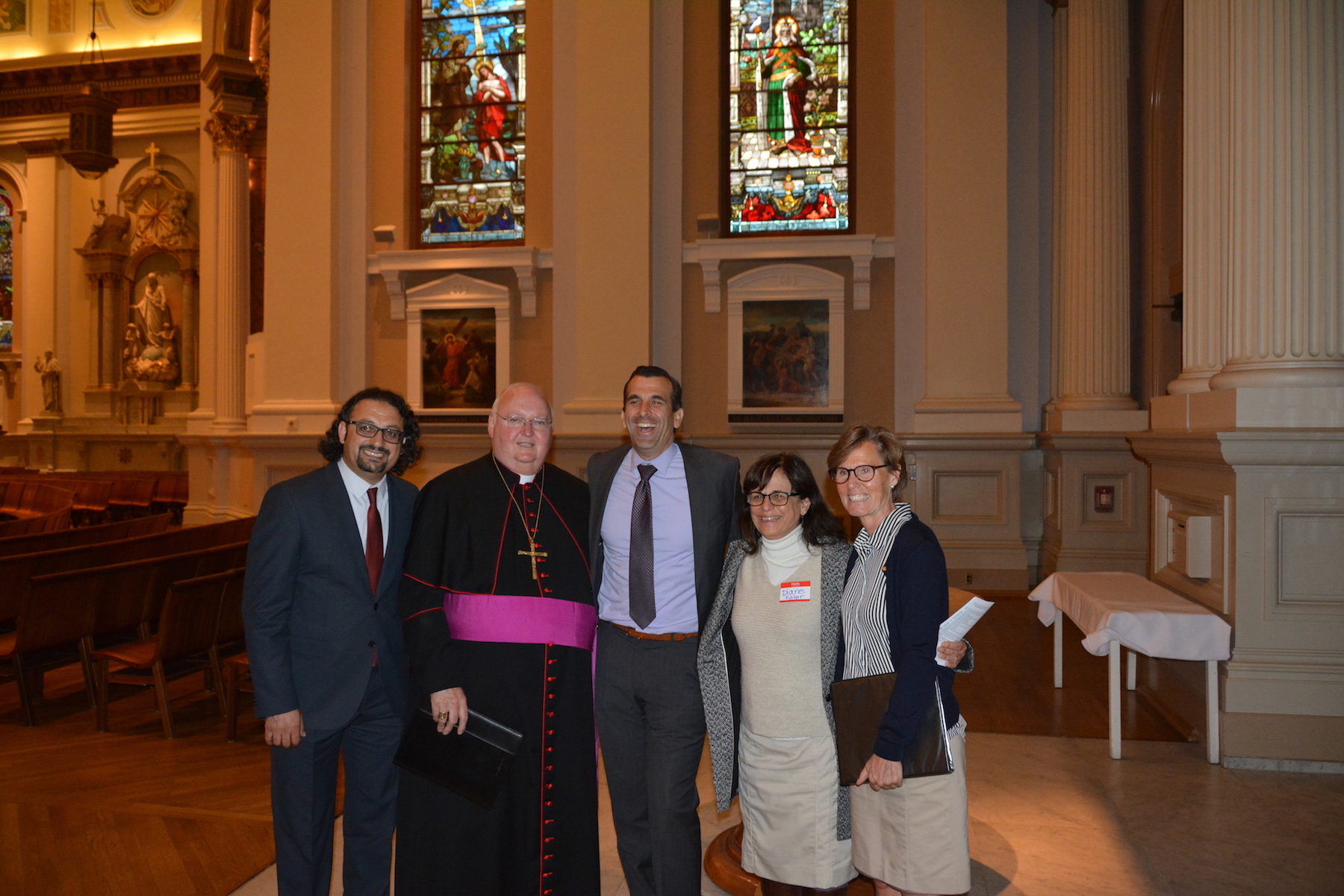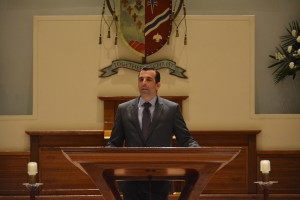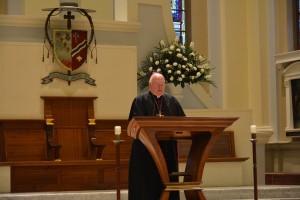An iftar dinner was hosted by Pacifica Institute and Cathedral Basilica of St. Joseph in San Jose on June 8. Among distinguished guests were Bishop Patrick J. McGrath and San Jose Mayor Sam Liccardo. There were prayers said which were followed by speeches on the importance of dialogue, friendship, and commonalities among our faiths.
Below is the complete transcript of Bishop McGrath’s speech from the evening.
As-salamu alaykum! Peace be with you!
When we imagine a world in which we live together, we imagine a world that is built on mutual respect, honest dialog and interaction. Thank you for inviting me to speak to the theme, “Living Together: Respect, Dialogue and Interaction.” The task of faith communities – whether they be Christian, Muslim, Hindu, Jewish, Buddhist – is to show respect for the poor and vulnerable and to dialogue with one another. The common tenants of our faith call on us to respect others whose life styles, religion and politics may be different from our own. In addition, our faith encourages us to talk to one another, even when we disagree. When we neglect these fundamental tasks of our religion, the gap between rich and poor, black and white, native born and foreign born, grow and deepen. The conversation between Christian and Jew, Muslim and Hindu becomes stilted and focused only on crisis. The abyss widens between faith leaders, and dialogue is reduced to angry populist slogans.
The task of all faith communities is ultimately interaction. We cannot allow ourselves to become isolated in our own particular theologies and rituals. We must find a way to reach and connect with one another. Pope Francis calls on us to be open, to have, as he says, “…an openness of heart which makes possible that closeness without which genuine spiritual encounter cannot occur” (E.G., no. 171).
The interaction for which we aim must be more than merely sitting on a committee or helping out at a homeless shelter. Good as that may be, we must have an actual encounter with one another. Encounters begin with a willingness to seek others out and to find out who they really are, not just what they believe. In Pope Francis’ pastoral exhortation, The Joy of the Gospel, he wrote, “We need to practice the art of listening…” — sometimes not easy!
Listening requires us to be willing to deal with the unfamiliar and with the uncomfortable. Ultimately, listening will draw us toward those who are different from ourselves. Listening allows us to enter into conversation: we listen because we want to understand. Listening leads us to appreciate differences, not fear them. As people of faith, we believe that God created each of us uniquely. We differ in race, gender, religion, way of life — but these differences provide us with an opportunity to come to know one another, and ultimately come to know God who is the creator of us all.
When our primary agenda is to listen, our spiritual encounter with others will not implode into a debate about who is right or wrong. Instead, having no preset script to guide our conversation, we simply walk together. When we listen, our religious hubris has no power. Walking with another person on the journey of mutual discovery allows us to get to know one another and to behold the Divine in the other.
At some time in our spiritual encounter, we will have established trust between ourselves, enabling us to reckon with history. In some cases, reckoning with our shared history will require us to find a way back to one another. Listening and walking the journey with one another leads us to the very heart of the spiritual encounter experience of which Pope Francis speaks, namely, reconciliation.
In the course of our journey together we may find that our history includes grievances. We cannot deny these grievances nor can we hope that feelings will mend on their own. If we choose to ignore injuries and hurts — whether in the distant past or as recently as the past few weeks — these grievances will inevitably metastasize into violence: A concert hall in Manchester, a bridge in London, a light rail train in Portland. These and other incidents throughout the world are symptoms of grievances—unresolved grievances– that have escalated into acts of violence.
As people of Abrahamic faith – Jews, Christians and Muslims– we are joined together through a common spiritual ancestor, Abraham. Abraham set himself, his family and descendants, apart from other tribes and nations to be a light for the world: a light of hope, of justice and healing. Therefore, because we share this one ancestor, we must do everything within our power to step forward together, as co-partners in dialogue to reaffirm our bond and to be that light of hope, justice and healing.
Unfortunately, there are many individuals who invoke the name of God in the name of our specific religious traditions — populist politicians, dictators and armed insurrectionists. Hiding behind the veil of piety and religion, they claim to speak for an entire religious tradition, and they use their religious identity as a pretext for acts of violence and repression. But after the dust has settled over the rubble, it is we — the leaders of congregations and public figures in religion, who are then taken to task by society to explain exactly what was done in the name of God. This cannot continue. This must not continue.
So what must we do to keep the dialogue moving forward without being derailed by these acts of violence? First: we cannot put the blame on one another. If Christians and Jews focus only on the extremists who use Islam as a pretext for violence but at the same time, fail to recognize the extremists in their own religious communities, our conversation will indeed fall apart. If Muslims ignore how political dissidents are handled in countries that are predominately Muslim, again, our conversation will indeed fall apart.
If Christians choose to ignore the legacy of the Crusades, if Jews and Christians ignore European and American expansion and economic colonialism in the Near East, then our conversation ends. If Muslim countries blame others for the tension and problems in their own communities, there will be no genuine conversation. Instead, our interaction will eventually be reduced to polite, innocuous salutations.
We must have real—genuine–conversations. Courageous conversations. As people of Abraham, we must be brave enough to face history together. We must be faithful enough to realize that no matter how difficult the conversation may become, we will, in the end, emerge stronger and more committed to building a peaceful world through respect, dialogue and interaction. If we refuse to recognize and address the reality that grievances are born in injustice and repression and that our religions have been co-opted by xenophobic populists, cultural warriors and armed insurrectionists, then every step forward we take will be inauthentic progress, and therefore, not progress at all.
In his recent trip to Cairo, Pope Francis said, “We have an obligation to denounce violations of human dignity and human rights, to expose attempts to justify every form of hatred in the name of religion, and to condemn these attempts as idolatrous caricatures of God…” As religious leaders we must take the lead to end the cycle of violence done in the name of our faiths. Our steps forward certainly require candor and honesty, but our dialogue must also be tempered with prudence.
Prudence keeps our passions in check. Prudence prevents us from making comments that would reduce our encounter experience to a debate. Prudence reminds us that when we walk together we seek fellowship, not blame. Prudence allows us to actually have the dialogue that will build bridges.
Now is the time to build bridges. Some politicians seem to be building their careers by scapegoating racial and religious minorities. What I fear will be the result of this type of action is a legacy of diminished civil rights and racial and religious profiling. Faith communities cannot remain silent. Silence is complicity. Our common faith must stand up to the ever-expanding circle of intolerance.
What then is our next step? Most certainly, respect and dialogue. But what is also , for actual progress, is intentional interaction. As the Catholic leader in this county, I understand the challenge of intentionally interacting with the Muslim community. Last January in the name of the Catholic community, I made a commitment to engage clergy, Catholic educators, and parishes to begin a process of mutual dialogue with Muslims through the methodology of encounter. This commitment is critical because just last month the Catholic News Service reported a survey that examined American Catholic’s views of Muslims. Sadly, three in ten Catholics admit to having unfavorable views about Muslims. It also appears that Catholics are less likely than other Americans in the general public to know a Muslim personally. The survey also indicated that many Catholics are unaware that Muslims believe in the same God as do Catholics and Jews. It was no surprise, therefore, that the survey further indicated that few Catholics realize that Muslims revere Jesus and honor the Virgin Mary as the mother of Jesus.
The good news in all of this is that at the highest level of the Church, steps are being taken to turn things around. Pope Francis is leading the way for Muslim-Catholic interaction. On Holy Thursday, 2013, the Pope washed the feet of an elderly Muslim man and a few months later, in 2014, he sent a letter to the most prominent Sunni university in Cairo, and called for “mutual understanding between the World’s Christians and Muslims in order to build peace and justice.” That same year, the Pope visited the West Bank with a Muslim friend from Argentina and in 2016, the Pope met with Hassan Rouhani, the President of Iran. That meeting initiated new dialogue and opened the way for new opportunities to address the ongoing conflict in the Near East and the growth of extremist organizations. The Pope has also been a strong proponent for Muslim refugees. In short, the Holy Father has affirmed the need for intentional interaction. His pastoral commitment to Muslim and Catholic relations is a clear indication on where we as Christians, Jews, and Muslims should also be. And of course by extension, where all faith communities should be.
To paraphrase Pope Francis, what our world needs is peacemakers, not fomenters of conflict; firefighters, not arsonists; preachers of reconciliation, not instigators of destruction. Let us be the peacemaker committed to respect, dialogue and mutual interaction. Let our Ramadan Fast prepare us for this most important task.
Thank you and may God the Merciful and Wise, bless you and keep you safe from all harm and anxiety. Amen.



